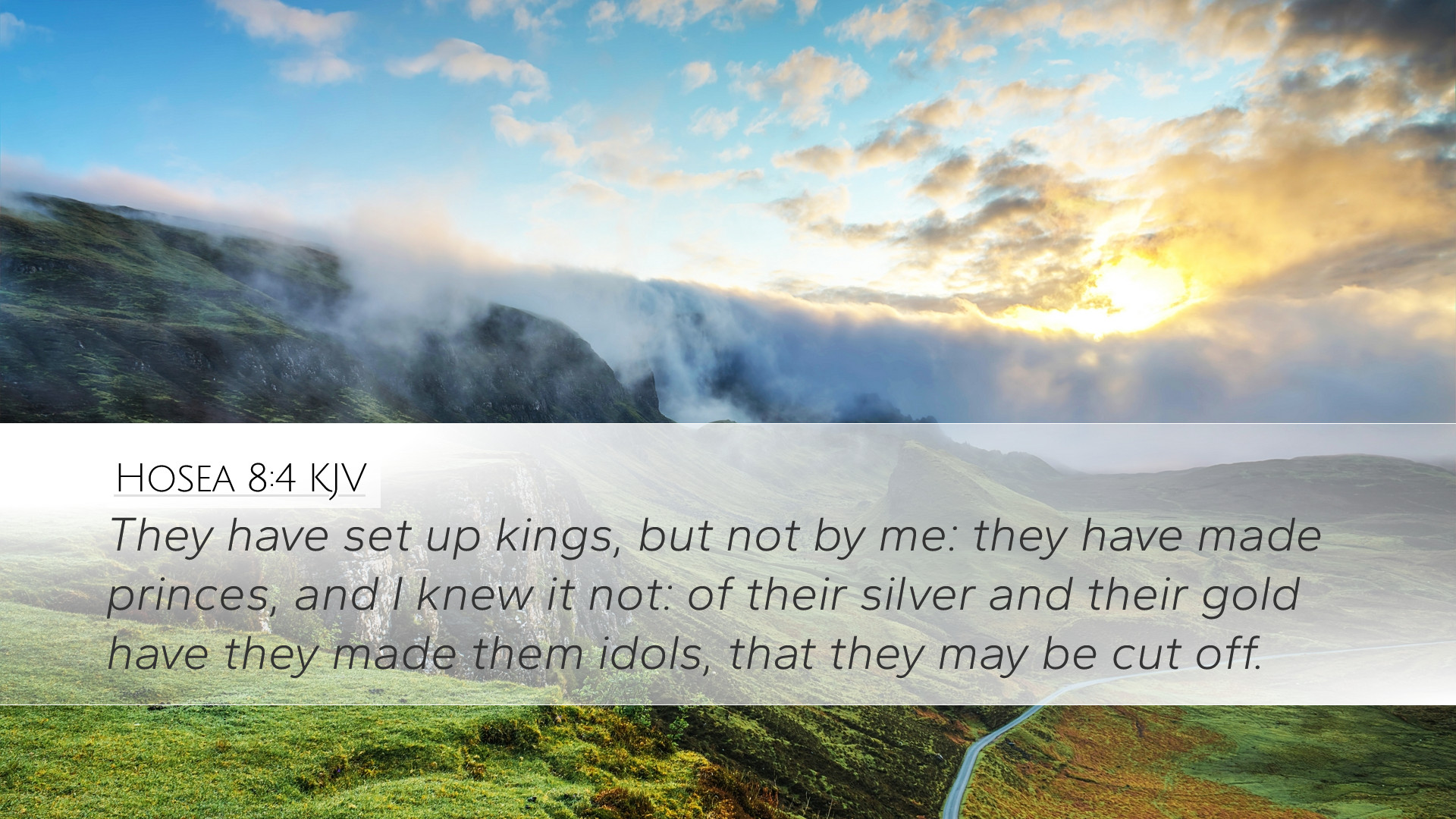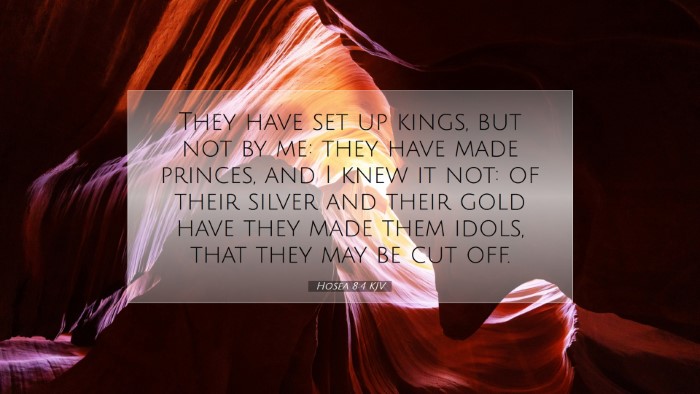Old Testament
Genesis Exodus Leviticus Numbers Deuteronomy Joshua Judges Ruth 1 Samuel 2 Samuel 1 Kings 2 Kings 1 Chronicles 2 Chronicles Ezra Nehemiah Esther Job Psalms Proverbs Ecclesiastes Song of Solomon Isaiah Jeremiah Lamentations Ezekiel Daniel Hosea Joel Amos Obadiah Jonah Micah Nahum Habakkuk Zephaniah Haggai Zechariah MalachiHosea 8:4
Hosea 8:4 KJV
They have set up kings, but not by me: they have made princes, and I knew it not: of their silver and their gold have they made them idols, that they may be cut off.
Hosea 8:4 Bible Commentary
Commentary on Hosea 8:4
Bible Verse: Hosea 8:4 - “They set up kings, but not by Me: they made princes, and I knew it not: of their silver and their gold have they made them idols, that they may be cut off.”
Introduction
The verse from Hosea encapsulates a profound message regarding the consequences of human agency detached from divine input. The Israelites' insistence on establishing leadership and creating idols without God's guidance reveals their deep spiritual malaise. The commentaries by Matthew Henry, Albert Barnes, and Adam Clarke provide rich theological insights into the implications of this passage.
Interpretation and Analysis
1. Human Authority Without Divine Consent
Matthew Henry emphasizes the folly of Israel in appointing kings and princes without seeking the counsel of God. This choice led them away from divine kingship and left them vulnerable to the corrupt influences of their own making. The commentary asserts that legitimate authority should always align with God’s will, as opposed to the arbitrary appointments seen in Israel's history.
2. The Nature of Idolatry
Albert Barnes highlights how the Israelites’ pursuit of kings illustrates their rejection of God as their true sovereign. Rather than relying on divine provision for leadership, they sought to create their authority from material wealth—namely, silver and gold. This act of crafting idols represents a broader theme of misplaced trust, wherein spiritual and material idols supplant reliance on God.
3. The Consequences of Apostasy
Adam Clarke discusses the severe implications of Israel's actions, stating that the making of idols and the establishment of kings leads to their inevitable downfall. Clarke notes that when a nation chooses its leaders and objects of worship based on material wealth and human wisdom, it disrupts the divine order. God's wrath is evident as He "knew it not," indicating divine disapproval and absence of participation in their choices.
Theological Themes
- Divine Sovereignty: The rejection of God’s authority is a recurrent theme in Scripture. This passage illustrates the Israelites’ failure to acknowledge God's rightful place in their governance.
- Idolatry: The connection between wealth and idol creation is elucidated, demonstrating the danger of materialism overshadowing spiritual integrity.
- Apostasy: The consequences of departing from God are profound, often leading to societal decay and ultimately, divine judgment.
Practical Application
This verse serves as a cautionary tale for contemporary believers and leaders. The reliance on human wisdom and material resources for guidance in matters of leadership can lead a community away from God’s intended path. It urges pastors and church leaders to ensure that their decisions align with scripture and invoke divine wisdom rather than cultural or economic pressures.
1. Seeking Divine Guidance
Just as the Israelites failed in seeking God for kingship, modern leaders must prioritize prayer and scriptural consultation over personal ambition and popular trends.
2. Identifying Idols in Modern Contexts
Individuals and churches today must reflect on what they place their trust in—be it wealth, technology, or status. Understanding and identifying these modern idols can lead to a revival of faith and reliance on God alone.
3. Recognizing the Danger of Apostasy
The warning from Hosea is clear. Deviating from God’s path opens the door to chaos both personally and communally. Regular self-examination and community accountability are essential.
Conclusion
Hosea 8:4 serves as a timeless reminder of the importance of divine ordination in leadership and worship. The insights from Henry, Barnes, and Clarke urge contemporary believers to reflect on their practices, ensuring that all actions align with God’s will to avoid the pitfalls of idolatry and apostasy.


